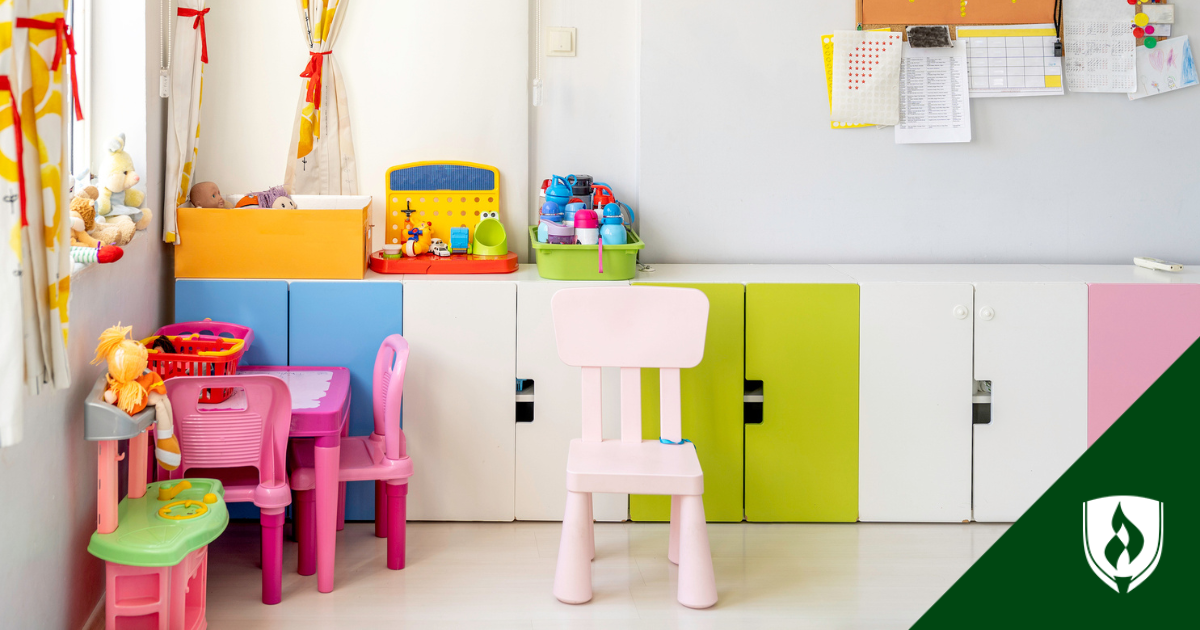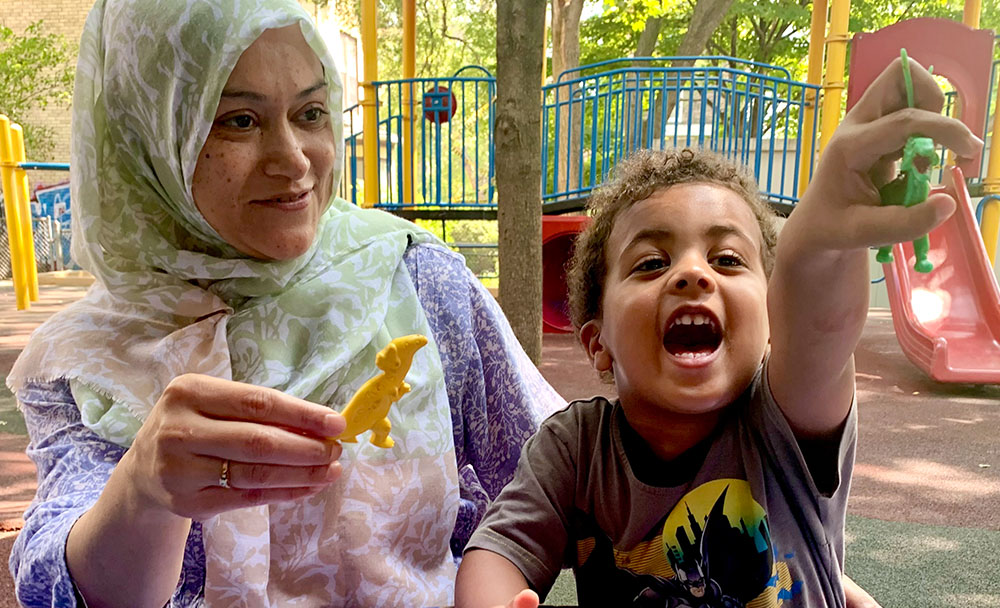The Role of Childcare in Cultivating Your Kid's Cognitive and emotional Abilities With Structured Play and Educational Tasks
The function of daycare in supporting a toddler's cognitive and emotional growth is commonly undervalued, yet it serves as an essential environment for organized play and academic tasks. Through carefully made interactions and experiences, caregivers help with essential abilities such as emotional awareness and analytical. These foundational components not only enhance a kid's capacity to get in touch with peers however also foster strength and flexibility in different circumstances. Comprehending the nuances of just how these characteristics unfold raises crucial concerns regarding the long-lasting influence of early childcare experiences on individual growth and social combination. What might that mean for future development?
Importance of Organized Play
Structured play is an essential part of young child advancement, as it offers a framework through which youngsters can participate in significant interactions and learning experiences. This kind of play is purposefully created to promote various developmental abilities, such as cognitive, social, and physical capabilities. By joining structured tasks, young children learn to adhere to policies, take turns, and accept peers, all of which are essential for their social skills.

Furthermore, structured play often includes academic components, such as counting, color acknowledgment, and language advancement, seamlessly incorporating learning right into fun tasks. This method not just catches kids' interest yet likewise enhances necessary principles in an enjoyable way. Overall, structured play is critical in promoting a well balanced growth, furnishing kids with the foundational abilities necessary for future discovering and social communications.
Emotional Development in Childcare
Daycare environments play an important function in promoting emotional development in toddlers. These settings offer children with opportunities to interact with peers and caregivers, facilitating the development of essential social-emotional skills. Through regular communications, kids discover to acknowledge and express their feelings, such as unhappiness, disappointment, or delight, which is essential for their psychological maturity.

Moreover, the organized environment of childcare enables children to experience a selection of emotions in a secure area. When transitioning from home to day care and create durability as they browse new partnerships and experiences, they learn to handle feelings of separation anxiousness. In general, the psychological development promoted in childcare not only advantages kids during their developmental years yet also lays the foundation for healthy and balanced interpersonal partnerships and emotional wellness throughout their lives.
Cognitive Abilities Through Activities
With involving in a range of tasks, kids in daycare settings can dramatically enhance their cognitive skills. Structured play and instructional jobs are vital in advertising cognitive growth, as they provide chances for expedition, analytic, and crucial thinking. Tasks such as problems, foundation, and memory games challenge young children to believe artistically and logically, promoting essential skills like spatial understanding and pattern acknowledgment.
Moreover, interactive storytime sessions motivate language advancement and comprehension. By paying attention to tales, kids find out to process information and involve their creative imaginations, which enhances their narrative skills and vocabulary. Additionally, hands-on activities involving arts and crafts stimulate great electric motor abilities while additionally urging self-expression and creativity.
Sensory play, such as sand or water activities, enables toddlers to try out different textures and materials, advertising inquiry-based understanding. These experiences not just boost cognitive abilities yet additionally infuse a feeling of interest regarding the world around them - infant daycare near me. In general, the diverse series of cognitive activities provided in daycare settings plays an essential function in shaping a toddler's capacity to believe critically, address issues, and engage meaningfully with their surroundings
Social Links and Interaction
In a nurturing setting, kids normally forge social connections and engage in communications that are vital for their interpersonal and psychological growth. Childcare setups provide a special possibility for youngsters to connect with peers, promoting important social skills such as sharing, teamwork, and conflict resolution. These interactions aid toddlers discover to browse their emotions and comprehend the perspectives of others, which are vital parts of emotional intelligence.
Via structured play and group activities, young children are urged to communicate their sensations and thoughts, enhancing their verbal abilities and advertising empathy. Engaging with peers likewise presents them to varied social standards and behaviors, enriching their understanding of social dynamics. Regular communication with various other youngsters aids to construct a feeling of area, providing a support system that this link is advantageous for emotional growth.
As toddlers participate in collaborative tasks, they learn the significance of negotiation, teamwork, and perseverance. These foundational social abilities are critical as they plan for future partnerships, both in academic settings and past. Eventually, the social connections created in childcare play a considerable role in shaping a kid's capability to interact favorably and successfully with others throughout their lives.
Function of Caregivers in Development

Caretakers play a crucial duty in cultivating kid growth, specifically in the context of the social communications they experience in day care settings. These professionals offer a nurturing environment where kids can discover their feelings and cognitive capabilities with structured play and . By taking part in meaningful conversations, caregivers support language growth and boost social abilities.
In addition, caretakers version psychological actions and proper behaviors, aiding kids discover empathy and conflict resolution. Their visibility likewise produces a complacency, which is important for youngsters to with confidence discover their environments and involve like this with peers.
In enhancement to emotional and social assistance, caregivers contribute in applying instructional curricula that promote cognitive growth - daycare near me for infants. They present age-appropriate tasks that promote inquisitiveness, critical thinking, and problem-solving abilities. This organized strategy makes certain that young children not only appreciate their playtime yet likewise acquire foundational expertise vital for future understanding
Ultimately, the top quality of caretaker communications dramatically impacts a young child's total development. By promoting a encouraging and engaging atmosphere, caretakers help prepare for healthy and balanced psychological and cognitive growth, outfitting youngsters with vital abilities for their long-lasting journey.
Conclusion
Finally, day care offers as an essential setting for fostering cognitive and emotional development in toddlers. Through structured play and go now , children experience considerable growth in their capability to acknowledge and reveal feelings, establish essential thinking abilities, and kind crucial social links. The role of caregivers contributes in promoting these experiences, ensuring that each child benefits from a nurturing atmosphere that promotes lifelong psychological health and cognitive improvement.
The duty of day care in nurturing a toddler's emotional and cognitive growth is often ignored, yet it serves as a crucial setting for organized play and academic tasks. Generally, structured play is critical in promoting a balanced development, equipping kids with the fundamental skills required for future knowing and social interactions.
Childcare atmospheres play an important role in cultivating emotional development in toddlers. Overall, the emotional development fostered in childcare not only benefits toddlers throughout their developmental years but also lays the foundation for healthy and balanced social connections and emotional health throughout their lives.
With structured play and group tasks, toddlers are motivated to communicate their sensations and ideas, improving their spoken skills and advertising compassion.